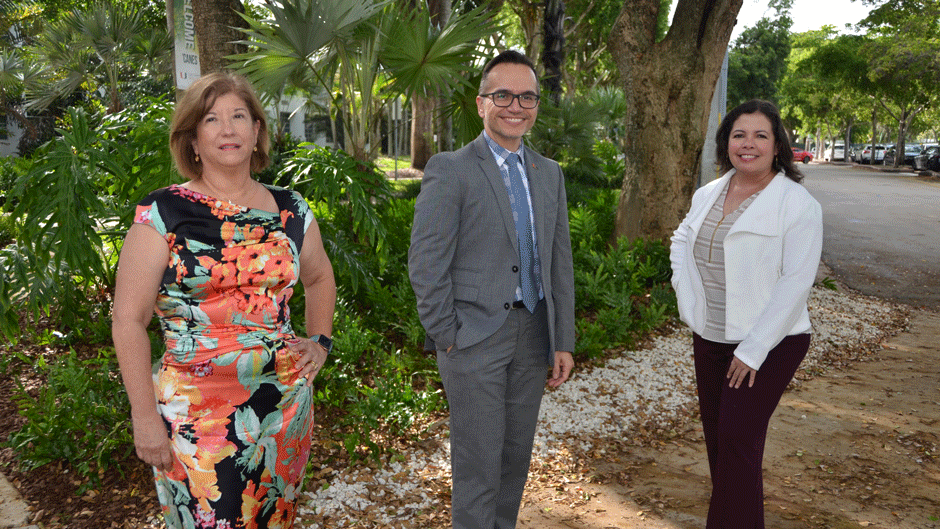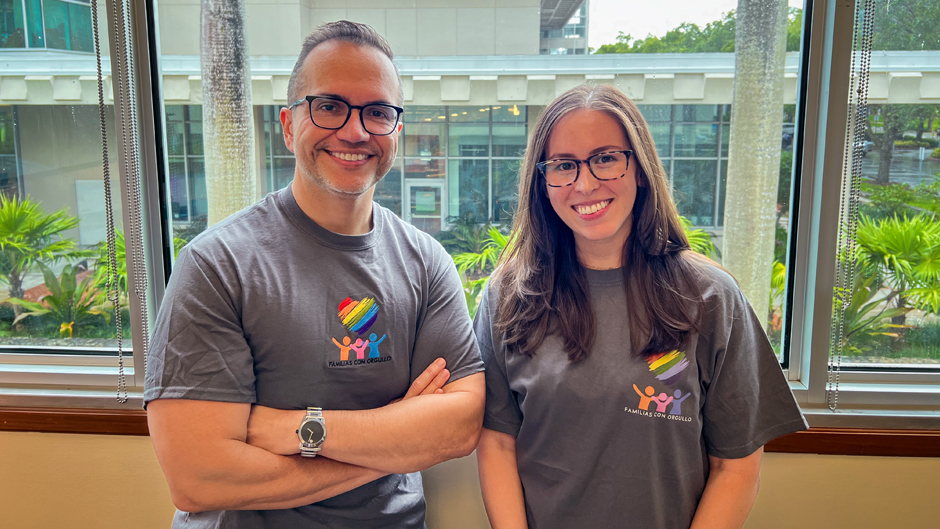When Luciene Espinosa was 12, she told her mother she thought she was a lesbian. At the time, opening her soul to her conservative, Cuban mom took courage, but Espinosa felt compelled to share her feelings with the person who always had been her best friend.
After that conversation, the dynamic shifted. Her mother dismissed the idea and assured Espinosa that her preference in girls was a stage. It would surely pass. She tried forcing Espinosa to wear more feminine clothes. Soon, extended family members began to treat Espinosa differently.
“Throughout my upbringing, I was the golden child of the family,” she said. “But when I came out, I was the black sheep.”
The next year, her mental health worsened. She even tried to take her own life.
“When the judgment and shaming start at just 12 years old, it’s lonely. I felt like there was something wrong with me,” said Espinosa. “I knew I was gay, so I felt like if this was the way I would be treated by others, what is the point of being here?”
Espinosa’s painful experience is relatively common. According to the U.S. Centers for Disease Control (CDC), Hispanic youth who identify as gay, lesbian, bisexual, or transgender—also known as sexual minorities—are at a much higher risk for depression, suicidal thoughts, and drug and alcohol abuse than their straight Hispanic peers.
Recognizing these troubling figures, in early 2019, professor of nursing and health studies Guillermo “Willy” Prado and public health graduate student, Alyssa Lozano, decided they wanted to explore the issue more. Lozano interviewed Hispanic youth who identified as sexual minorities to better understand the process of disclosing their sexual orientation and gender identity to their parents and families. She also wanted to unpack why they were using drugs and getting depressed.
Prado was well suited to lead this effort, as much of his research has centered on Hispanic adolescents. With colleagues, he created an intervention more than 20 years ago called “Familias Unidas” to help improve family dynamics and communication among Hispanic parents and their adolescent children. The highly successful program now has been adapted to virtual platforms and is used in several states, as well as in countries like Chile and Ecuador.
But Prado had never delved into crafting an intervention for sexual minority youth.
“We tried to understand why these kids were using substances and getting depressed and a lot of it came down to the stigma they still experienced,” said Prado, who is also dean of the Graduate School, the University’s vice provost for faculty affairs, and holds faculty appointments in nursing and health studies, public health sciences, and psychology. “We also saw that drug use and depression were higher among teens who reported that their disclosure process was not a positive one.”
Armed with this information, Prado, Lozano, and their colleagues, set out to design a new intervention called “Familias con Orgullo,” or Families with Pride, which aimed to counteract the harmful implications of coming out on Hispanic youth who identify as sexual minorities. They asked Maria Tapia, a senior research associate, and Yannine Estrada, research assistant professor at the School of Nursing and Health Studies—who implemented Familias Unidas—to collaborate with them. And while Familias con Orgullo takes some cues from Familias Unidas, it is vastly different, Prado noted. Funded by the University, including funding from the Sylvester Comprehensive Cancer Center, a pilot study of Familias con Orgullo began in late 2019 with 30 local families in three cohorts.
“This is a population where there is so much need,” said Prado. “We want to be able to prevent and reduce drug use, as well as to reduce rates of depression, and to improve family dynamics to help youth and parents navigate this coming out process.”

After the pilot, many of the families involved reported improved communication overall, and most teen participants said their mental health had improved, according to Lozano.
Then in May, the National Institute on Minority Health and Health Disparities gave Prado and his team more than $3 million to expand the program during the next five years, building upon the initial pilot study. Starting this fall, Prado and his team hope to recruit 306 Hispanic families from across South Florida with teens who recently have divulged their sexual orientation to one of their primary caregivers.
“Long-term, assuming the results are positive, I would like to see this program—much like Familias Unidas—implemented and accepted across the United States as a standard of care for Hispanic sexual minority youth who have recently disclosed to their parents,” Prado said. “These parents are at different stages of acceptance, so a key goal is to increase that level of acceptance, regardless of where the parents are on that continuum.”
Espinosa and her mother were one of the 30 families who were part of the pilot for Familias con Orgullo. When she learned about the program from a close friend, Espinosa begged her mother to go. It was a tough sell. Yet, today, Espinosa and her mother are close again.
“Once I was accepted by the person I loved the most again, it completely calmed me down,” said Espinosa, who is graduating from Miami Dade College this summer with an associate’s degree in psychology. “It got quiet in my head. And I give thanks every day that this program existed and that somehow I found it; because otherwise, I feel like my life would have taken a very different turn.”
Familias Con Orgullo is a 12-week program that includes parent-only group sessions, child-only group sessions, and individualized parent-child sessions. For some youth in the pilot, Lozano said, it was helpful for them to be among peers. Yet to Espinosa, the parent group sessions were even more helpful.
“My mom had treated me with so much rejection, but when she was in a place with parents who were supporting their children like they are just as normal as someone straight, it shifted her opinion,” she said. “It made her question her own beliefs, and she did a complete 180. It saved our relationship in the best way possible.”
Lozano remains in touch with many of the youth participants from the pilot and marvels at how their lives changed afterward. One former participant, Javier Gomez, even spoke at the White House last spring when President Joseph Biden signed an executive order advancing equality for LGTBQ+ individuals. Lozano looks forward to working with more Hispanic families in the fall.
“I was able to learn so much about the challenges these youth face and how resilient they are, which is so inspiring to me,” said Lozano, who graduates this summer and will join the School of Nursing and Health Studies as a research assistant professor in the fall. “I want to continue to focus on this population because these kids were so open and candid about what they went through—no literature review could give that level of detail. And it’s really important to be doing this work right now.”
Espinosa agrees.
“If this is able to save one person, it’s worth it,” she said. “And if it saved me, I can only imagine what it would do to help anyone else in my position.”
If you are interested in participating in Familias con Orgullo or want to learn more, contact the research team at famconorgullo@miami.edu.
